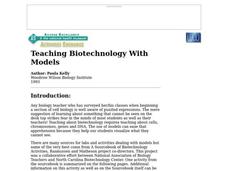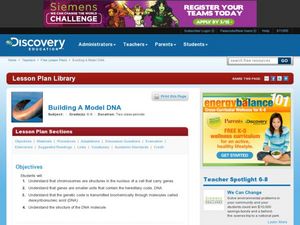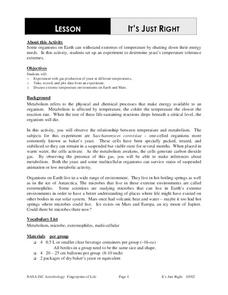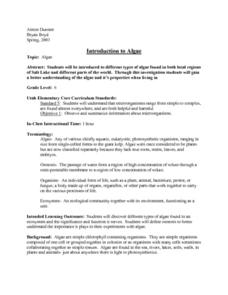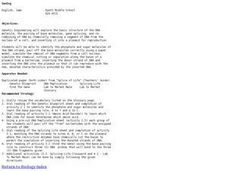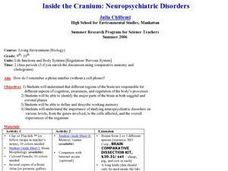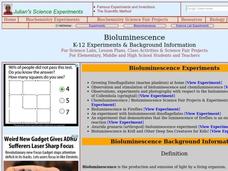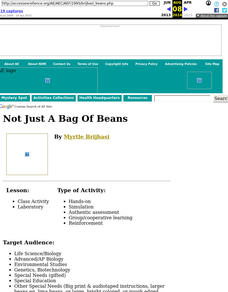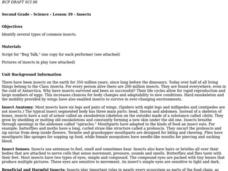Curated OER
Teaching Biotechnology With Models
Students are introduced to biotechnology by using models. The teacher uses A Sourcebook of Biotechnology Activities, Rasmussen and Matheson project co directors. One of the activities in the book is: students use a scale models to very...
Curated OER
Building a Model DNA
Students explain the function of DNA in the body. In this biology lesson plan, students build a DNA model using simple materials. They demonstrate how bases pair up in the helix.
Curated OER
Evolution Explorations
Students compare characteristics of animals and human beings. In this biology lesson, students observe an animal and record their observations. They infer whether the evolution theory is true or not.
Teach Engineering
Hydrogen-Oxygen Reaction Lab
High schoolers conduct an experiment using the reaction of hydrogen and oxygen. After pairs balance the chemical equation for making water, they mix different ratios of hydrogen and oxygen in a chemical reaction. Classmates...
Curated OER
Dinosaurs 1: Where Are the Dinosaurs?
Students explore dinosaurs and their extinction. In this dinosaur lesson, students view dinosaur websites and videos to gain an understanding of the world long ago. Discussion questions follow. Students create a paper mache dinosaur egg.
Curated OER
Microbiology Lesson Plan Aseptic Technique
Learners examine the importance of aseptic technique, become familiar with media plates, and general microbiology techniques. They study the benefits and dangers of bacteria and other microorganisms in their lives.
Curated OER
Molecular Evidence for Evolutionary Relationships
Students compare the amino acid sequences in cytochrome-c for a variety of organisms and use this information to infer evolutionary relationships. Students investigate the role of homeobox genes and what this indicates about the...
Curated OER
It's Okay to Exhale: Photosynthesis and Cellular Respiration
Students will observe the differences between photosynthesis and cellular respiration. Then they observe the links due to climate changes and relate how climate change affects their lives.
Curated OER
It's Just Right
Learners conduct an experiment to determine the temperature tolerance of yeasts. In this biology lesson, students collect data and compare them by plotting graphs. They explain how extreme temperatures affect organisms.
Curated OER
Introduction to Algae
Students explore different types of algae found in both local regions of Salt Lake and different parts of the world. They discover different types of algae found in an ecosystem and the significance and function it serves.
Curated OER
Sea Urchin Embryology
Students explore the process of evolution. They examine examples of how homeotic genes may work and obtain gametes. Using a microscope, students observe the fertilization of sea urchins. They video tape the process and write a...
Curated OER
GenEng
Students investigate the process of genetic engineering. In this genetic engineering lesson plan, students use paper models of DNA and plasmid bacterium to investigate the process of replicating DNA, splicing genes from DNA, and...
Curated OER
Geneticist for a Day
Students discuss and compose a document discussing the transmission of the Huntington's gene- dominant or recessive, sex linked, etc. Additionally, they ought to consider Dr. Wexler's own odds for contracting the disease.
Curated OER
Basic Vitamins: Water-Soluble and Fat-Soluble
Students examine vitamins and study their functions and food sources. They research what happens to vitamins when foods are overcooked. They prepare a microwaveable vegetable quiche.
Curated OER
Inside the Cranium: Neuropsychiatric Disorders
Students analyze different regions of the brain which are responsible for different aspects of cognition, awareness and regulating the body's process.
Curated OER
Bioluminescence
Students differentiate chemiluminescence from bioluminescence. In this biology lesson, students explain how fireflies and other animals emit light. They discuss the applications of engineered bioluminescence.
Curated OER
Biology - Virus Modeling
Students research one of the many types of viruses. They create a 3-D model of the virus they researched with graphics software.
Curated OER
Bad Algae!
Students explore algal blooms. In this ecosystem and health lesson plan, students define and describe harmful algal blooms, then discuss ways in which the impact of these algal blooms could be reduced. Students work in groups...
Curated OER
Not Just a Bag of Beans
Students determine the types of natural selection and variation that exists in a population, using beans.
Curated OER
Biomechanics of Sports
Young scholars examine the body's major organ systems and how they function and influence each other. They examine how the human body moves when involved in sports.
Curated OER
How Does a Green Plant Grow?
Students of all ages can explore the question "how do seeds grow?", design an experiment to answer the question, predict the outcome of the experiment then conduct the experiment.
Curated OER
Insects
Second graders brainstorm and identify several types of common insects. They play bug bingo, building bugs and an insect tree, observing real insects in the classroom and examining some of the things insects make.
Curated OER
Microorganisms: Good Guys or Bad Guys?
Students discover the role microorganisms play in our lives. In this decomposition lesson, students examine decaying foods and plants in order to analyze the different bacteria that grows. Students discuss the good and bad of...
Curated OER
Gaia: The Wisdom of the Earth
Learners are introduced to Gaia theory of natural homeostasis. They graph Earth's temperatures over time, construct terrariums or monitor the outdoor environment. Related videos titles are suggested, but may be outdated. The objectives...


